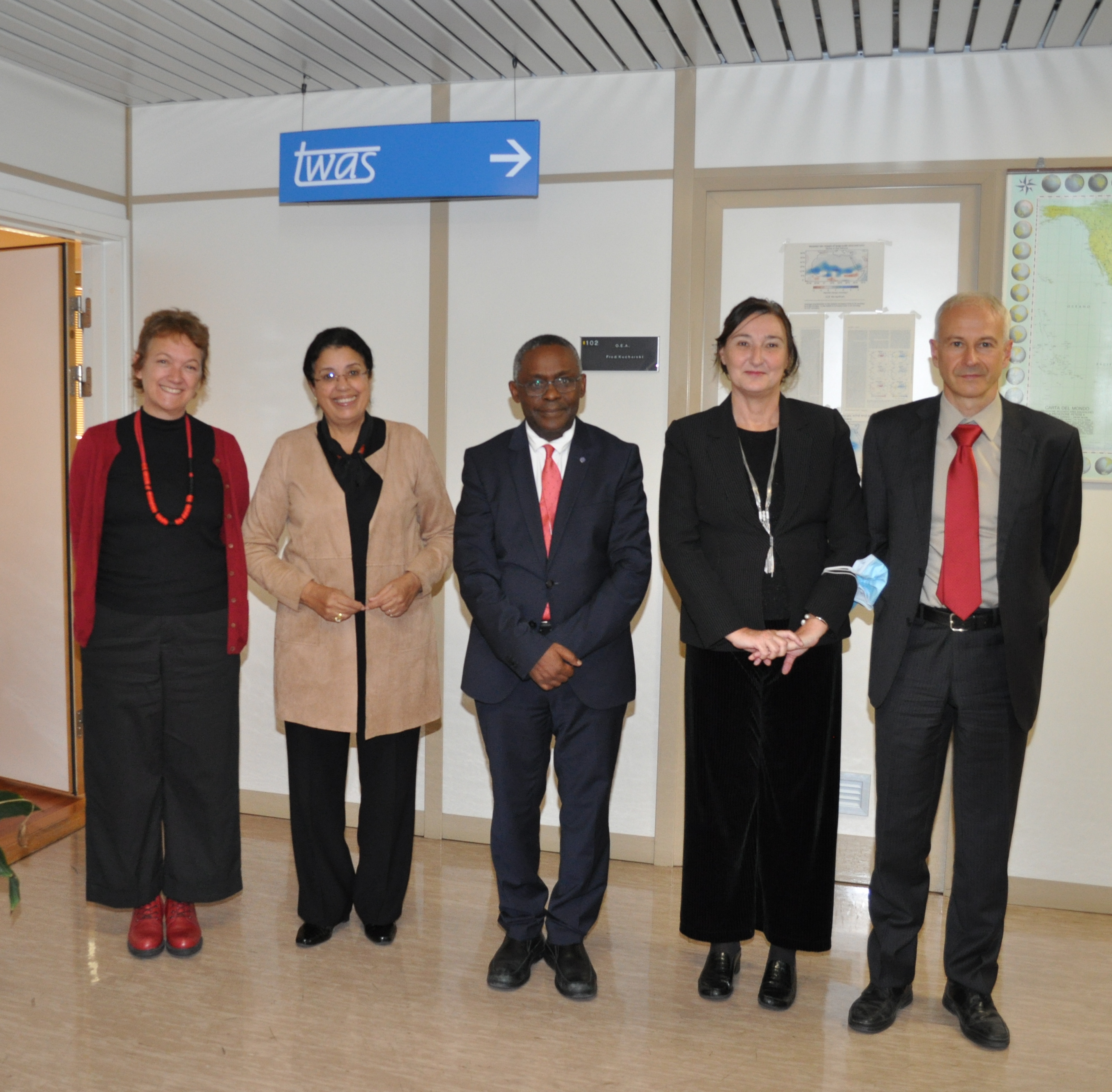
On 29 October, Deputy Director General and Head of the Department of Nuclear Sciences and Applications of the International Atomic Energy Agency (IAEA) Najat Mokhtar visited The World Academy of Sciences (UNESCO-TWAS), in Trieste, Italy, along with the Director of the Division of Physics and Chemistry of IAEA, Melissa Denecke.
After a brief personal welcome by TWAS Executive Director Romain Murenzi, the gathering moved to one of TWAS conference rooms, where the distinguished guests were also welcomed by Max Paoli, TWAS Programme Coordinator; Raffaella De Lia, TWAS Public Information Officer; and Tonya Blowers, Programme Coordinator of the Organization for Women in Science for the Developing World (OWSD).
Murenzi made a brief introduction of the Academy and its mission in French—a choice that was welcomed by IAEA Deputy Director. In the warm light of the autumn afternoon that flooded the conference room, Max Paoli gave a clear, brief and yet exhaustive overview of all programmes of the Academy, old and recent, illustrating their main aspects and their differences, providing examples of how such programmes affect and influence positively entire communities. It was then the turn of OWSD Programme Coordinator Tonya Blowers, whose presentation focused on the impact of her programmes on women scientists. She also provided a foretaste of the upcoming OSWD Sixth General Assembly and International Conference, the programme of which featured eminent guests such as Fabiola Gianotti Director-General of CERN, the European laboratory for particle physics, and included engaging lectures, including on storytelling. The pre-recorded presentation on the work of the InterAcademy Partnership (IAP) was then broadcast, as IAP Programme Coordinator Peter McGrath could not be present in person.
Mokhtar shared an overview of IAEA and of the Department she leads, emphasizing the applications and impact that nuclear sciences have on people's daily life, for example the equipment, based on nuclear-derived technique, to rapidly detect the coronavirus that causes COVID-19, for one. Nuclear science, she explained, is accurate, precise, quick and safe. The narrative—the storytelling, in fact—about it needs to shift, though, to include and inform about all the ways in which nuclear science positively affects our lives: from economic sectors to health, from food and agriculture to the environment, from water resources to industry. As a matter of fact, IAEA Department of Nuclear Sciences and Applications assists the Agency's Member States in meeting their development needs through nuclear science, technology and innovation, of all which then translates into improving peoples' lives.
The interest was piqued; questions were asked and answered from both side in a growing cordial and genuinely interested way—from the two IAEA high-level representatives towards TWAS Executive Director and Programme Coordinators and vice versa. The mutual interest in each other's work became palpable. Both parties realized, with pleasure, that IAEA and TWAS, with all due differences, have much in common and share similar goals.
Had it not been for the time constraints of previous travel arrangements, the meeting would have continued and, in fact, ended later than scheduled: the flow of brainstorming and increasing enthusiasm that overtook the participants, so interested in each other's work and in outlining a possible future cooperation, was hard to interrupt.
The afternoon ended with a photo op, on the very positive note typical of promising beginnings: the likely beginning of a friendly partnership, with the idea of far-reaching collaborations, in which IAEA could provide its solid technical expertise—with its 304 labs in 129 countries—and TWAS its programmatic experience with developing countries. To be continued. Definitely.
Raffaella De Lia

